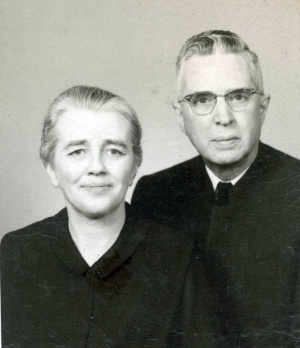Miller, Orie O. (1892-1977)

Orie O. "O. O." Miller, a Mennonite (Mennonite Church) layman, administrator who bridged the worlds of business and church. Born 7 July 1892, he was the eldest in the family of Bishop Daniel D. and Jeanette Hostetler Miller, Middlebury, Indiana. O. O. directed the farm work when his father traveled as an evangelist. Orie wanted to serve the church full-time as a school teacher, minister, or missionary. Before college he taught public school, and after his freshman year at Goshen College he directed Goshen's school of business.
Orie graduated from Goshen College in 1915, and that August married classmate Elta Wolf. The couple moved to Akron, Pennsylvania, where Orie soon became a part-owner in the shoe company headed by his father-in-law. Despite the growing success of the shoe business, Orie still felt called to church work, particularly the ministry. Three times he was a ministerial candidate at Ephrata Mennonite Church but the lot failed to fall on him. Speaking of his first experience in the lot, he said, "I just couldn't understand it. God didn't confirm my call. These were the most difficult days of my life." The church, however, did call Orie, asking him to help in relief work in Syria and Armenia after World War I. As church leaders met in Lancaster, Pennsylvania, to discuss a request for Mennonite workers for overseas relief, "Father Miller leaned over to me [and said], 'Orie, shouldn't you volunteer for this?"' With his wife's assent and a leave from the business for several months, Orie sailed for Beirut on the USS Pensacola on 25 January 1919.
Three months after his return to the United States, at a meeting regarding Mennonite needs in Russia, Orie again said yes when asked to go. But, how could he represent all of the committees? The idea for a Mennonite Central Committee (MCC) was born and became a reality on 21 July 1920. Orie was chosen to direct the first unit of volunteers. However, Orie's father-in-law, heading a business adversely affected by the postwar economic slump, was not ready to release him again. "You can't mix business and the church," he said. "You must give full time to the business or leave it." Orie went to Russia.
Orie and Clayton Kratz got into Russia and made arrangements to do relief work, however, the overthrow of the Wrangel Government prevented plans from being carried out. Orie returned to Constantinople and organized relief activities among the Russian refugees pouring into that city. He returned to Akron in spring 1921. He and his father-in-law eventually arrived at an arrangement whereby Orie gave about two-thirds time to the business and one-third to the church. Church work centered in world relief, missions, and education. He was executive secretary of Mennonite Central Committee, 1935-1958.
In 1940, at age 48, Orie was ready to devote even more time to the church. He turned over the sales work to others he had trained and continued as director and secretary-treasurer of Miller Hess and Company, president of Highland Shoe Company, also in Akron, and treasurer of A. N. Wolf Shoe Company, Denver, Pennsylvania. In the church, his influence was felt in the vast program of Mennonite relief and refugee resettlement, the Civilian Public Service Program, the organization and growth of Mennonite Economic Development Associates (MEDA), the organization of Menno Travel Service and Mennonite Mutual Aid, and numerous other Mennonite and inter-church causes.
Orie spelled out his philosophy of administration in three words: freedom, responsibility, and structure. "The administrator's job is to build a structure so everyone knows what his job is and to whom he is responsible. The capable administrator helps people work together without wasting time, fighting, or stepping on each other's toes. He helps people become a team. When a person accurately senses the structure, and fulfills his responsibility, he is free."
Orie and Elta had five children. Elta died in 1958. In 1960 Orie married Elta Sensenig. Orie died 10 January 1977 at the Landis Retirement Home near Lancaster, Pennsylvania.
Bibliography
Erb, Paul. Orie O. Miller: the story of a man and an era. Scottdale, PA: Herald Press, 1969.
Hess, J. Daniel. Series of articles in Christian Living (February, March, April 1963).
"Miller, Orie O." Gospel Herald 70 (8 February 1977). Reproduced in MennObits. "Gospel Herald Obituary - February 1977." Accessed 6 April 2006. <http://www.mcusa-archives.org/MennObits/77/feb1977.html>
Warkentin, A. and Melvin Gingerich, compilers. Who's Who Among the Mennonites. North Newton, KS: Bethel College, 1943: 172.
| Author(s) | John M Bender |
|---|---|
| Date Published | 1987 |
Cite This Article
MLA style
Bender, John M. "Miller, Orie O. (1892-1977)." Global Anabaptist Mennonite Encyclopedia Online. 1987. Web. 21 Nov 2024. https://gameo.org/index.php?title=Miller,_Orie_O._(1892-1977)&oldid=104410.
APA style
Bender, John M. (1987). Miller, Orie O. (1892-1977). Global Anabaptist Mennonite Encyclopedia Online. Retrieved 21 November 2024, from https://gameo.org/index.php?title=Miller,_Orie_O._(1892-1977)&oldid=104410.
Adapted by permission of Herald Press, Harrisonburg, Virginia, from Mennonite Encyclopedia, Vol. 5, pp. 588-589. All rights reserved.
©1996-2024 by the Global Anabaptist Mennonite Encyclopedia Online. All rights reserved.
